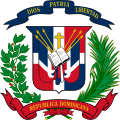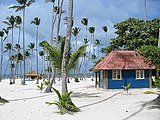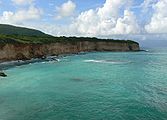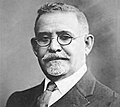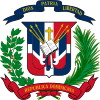Portal:Dominican Republic
Introduction
The Dominican Republic is a country on the island of Hispaniola in the Greater Antilles archipelago of the Caribbean Sea, bordered by the Atlantic Ocean to the north. Geographically, the Dominican Republic is part of the North American continent. It occupies the eastern five-eighths of the island, which it shares with Haiti, making Hispaniola one of only two Caribbean islands, along with Saint Martin, that is shared by two sovereign states. It is the second-largest nation in the Antilles by area (after Cuba) at 48,671 square kilometers (18,792 sq mi), and second-largest by population, with approximately 11.4 million people in 2024, of whom approximately 3.6 million live in the metropolitan area of Santo Domingo, the capital city. The Dominican Republic has the largest economy (according to the U.S. State Department and the World Bank) in the Caribbean region and is the seventh-largest economy in Latin America. Over the last 25 years, the Dominican Republic has had the fastest-growing economy in the Western Hemisphere – with an average real GDP growth rate of 5.3% between 1992 and 2018. GDP growth in 2014 and 2015 reached 7.3 and 7.0%, respectively, the highest in the Western Hemisphere. Recent growth has been driven by construction, manufacturing, tourism, and mining. The country is the site of the third largest (in terms of production) gold mine in the world, the Pueblo Viejo mine. The Dominican Republic is the most visited destination in the Caribbean. The year-round golf courses and resorts are major attractions. A geographically diverse nation, the Dominican Republic is home to both the Caribbean's tallest mountain peak, Pico Duarte, and the Caribbean's largest lake and lowest point, Lake Enriquillo. The island has an average temperature of 26 °C (78.8 °F) and great climatic and biological diversity. The country is also the site of the first cathedral, castle, monastery, and fortress built in the Americas, located in Santo Domingo's Colonial Zone, a World Heritage Site. (Full article...) Selected article -Bachata Rosa (Spanish for Romantic Bachata, translated literally as Pink Bachata) is the fifth studio album by Dominican singer-songwriter Juan Luis Guerra and his group 4.40. It was released on 11 December 1990, by Karen Records. It brought bachata music into the mainstream in the Dominican Republic and gave the genre an international audience. A Portuguese version of the record was released in 1992 under the title Romance Rosa; it was certified gold in Brazil. The album received a Grammy Award for Best Tropical Latin Album and two Lo Nuestro Awards for Tropical Album of the Year and Tropical Group of the Year. Seven singles were released from the record, four of which became top-ten hits on the Billboard Hot Latin Songs chart. The album debuted at number one on the Billboard Tropical Albums. It remained the top-selling album on the chart for 24 weeks and was certified platinum (Latin field) in the United States by the Recording Industry Association of America (RIAA). In Spain, the album spent eight weeks at the number one position on the chart. In the Netherlands, the record peaked at number two on the Mega Album Top 100 and was certified gold. Bachata Rosa was praised by critics, who commended Guerra's songwriting and the record's production, citing it as one of his most important works. (Full article...)General images -The following are images from various Dominican Republic-related articles on Wikipedia.
Selected picture -The port of Puerto Plata seen from the heights of the city
Selected biography -Juan Cespedes Uribe Tena (born March 22, 1979) is a Dominican former professional baseball infielder. He played shortstop, third base and second base during his career in Major League Baseball (MLB) for the Colorado Rockies, Chicago White Sox, San Francisco Giants, Los Angeles Dodgers, Atlanta Braves, New York Mets and Cleveland Indians. He bats and throws right-handed. Uribe began his professional career in 1997 when he was signed by the Colorado Rockies. After advancing through the minors, he made his MLB debut with the Rockies in 2001. He became their shortstop in 2001 and spent all of 2002 in that capacity. He missed part of 2003 with an injury and was traded to the Chicago White Sox following the season. After one season as a utility player, Uribe became the starting shortstop for the White Sox in 2005; he held that position for the next three years. While Uribe was with the White Sox, the team won the 2005 World Series against the Houston Astros. Uribe hit 21 home runs in 2006 but had a low on-base percentage. He hit 20 home runs in 2007 but had a low batting average with runners in scoring position (RISP). In 2008, Uribe lost his starting shortstop role to Orlando Cabrera and shifted to the starter at second, but then lost that job to rookie Alexei Ramírez. He eventually ended the season as the team's third baseman due to an injury to Joe Crede. (Full article...)Related portalsWikiProjects
Things to do
Associated WikimediaThe following Wikimedia Foundation sister projects provide more on this subject:
SourcesDiscover Wikipedia using portals | |||||||||||||||||||||||||

